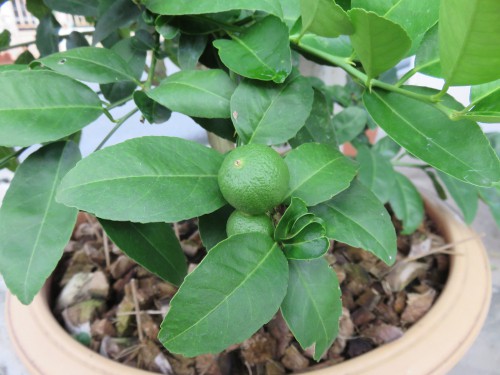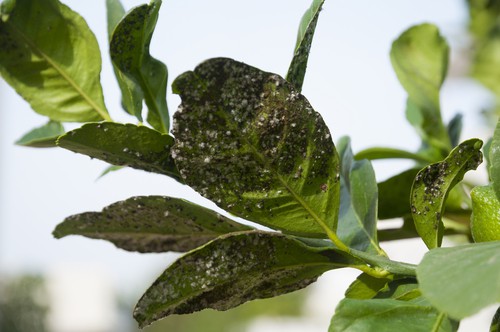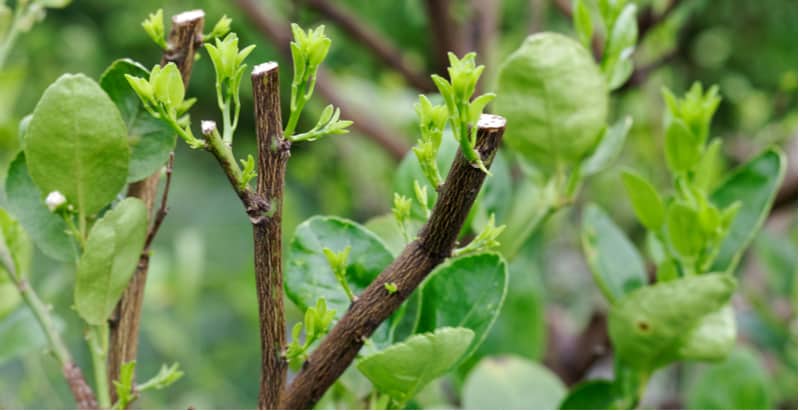Last updated on March 30th, 2022
Our site is reader supported, this means we may earn a small commission from Amazon and other affiliates when you buy through links on our site.
Making sure you have a healthy citrus tree will go a long way toward preventing any baby lemons from falling off prematurely. If you are seeing baby lemons fall off your tree, there are a handful of reasons behind it, some of which you can control, others you can’t. It is essential to determine the cause, where possible, to prevent a loss of your entire harvest.
Cause 1: Summer Drop
At the end of spring and the beginning of summer, citrus trees often drop marble-sized fruit. They do this to get rid of excess developing fruit so that the entire tree isn’t weighed down by the ripening fruit in the near future. If your tree is losing fruit around May-July, and you can’t determine another cause that seems plausible, it might merely be summer drop.
Solution:
Nothing to do here. This is natural, and it won’t mean the loss of your entire crop.
The next five causes are all things you can do something about. So, look to see if your citrus is giving signs of these and if so, take action where you can.
Cause 2: Drought
If your tree is inadequately watered, then it can get stressed. If your tree is particularly drought-stressed, it might get rid of all the fruit to ensure the branches and leaves can continue surviving. If this is the case, you might even notice most of the baby fruit being dropped, but a few remaining. If you have been attentive to your tree, watering it regularly, this might not be as likely.
Solution:
Be sure to water the tree well. Add mulch around the base to conserve water too. In pots, the soil should be kept moist but allow the surface of the compost to dry out between watering, however, not too much that the compost starts to shrink. Note than you should not leave them sitting in standing water in a saucer or tray.
Cause 3: Environmental

The weather can cause the baby lemons to fall off your tree too. If the temperatures go through sudden and drastic changes, especially right after your new fruit has set, it might force the tree to drop that baby fruit. High temperatures can help sweeten the flavour of your lemons, but only later in the summer once the fruit has started to mature. This can also happen when grown indoors if you have it in a room that gets warm in the day and cold at night.
Solution:
If you have very warm weather early in the summer, or drastic temperature changes, pay attention to the level of watering you give your lemons. Too much or too little can interfere with production and result in baby lemons dotting your lawn, not your kitchen. If your trees are growing in pots, then you can reduce watering to once per day. If you grow them indoors try and position them in a light room with a consistent temperature. A minimum winter night temperature of 10°C (50°F) is needed for lemons.
Cause 4: Citrus Canker
If the temperatures remain very warm and then switch to heavy rain, it can leave your plants susceptible to citrus canker. Most of the time this won’t result in dropped lemons, just blemishes on the rinds and leaves, but eventually, the fruit will drop if left untreated. This is not a very common problem in the UK.
Solution:
Apply copper sprays to combat citrus canker at the first signs.
Cause 5: Pests

Pests like thrips and mites can result in fruit loss.
Solution:
Apply an insecticide if you notice a pest infestation on your citrus plant.
Cause 6: Pruning

If you prune your tree too often, it can result in a loss of young fruit. Citrus trees rarely need to be heavily pruned, save pruning for the removal of diseased, dead, or decaying branches.
Solution:
Know when and how to prune. The best time is after the last frost or in summer, before August. If you prune any other time of the year the cold damage will show on new growth. Again, avoid heavy pruning.
Pay attention to the environment, the weather changes, and any signs of disease or pests. Treat the citrus as soon as you see these signs to give your baby lemons the best chance of survival.
Image credits – Shutterstock.com



1 Comment
Thanks for the answers and solutions. I’m going with it’s the summer. Probably 24 flowers have bloomed and many left tiny baby lemons—all have fallen off. I’ll make sure to watch the watering.
My Meyer lemon tree is in a pot in the dirt outside in Jackson, Tennessee.